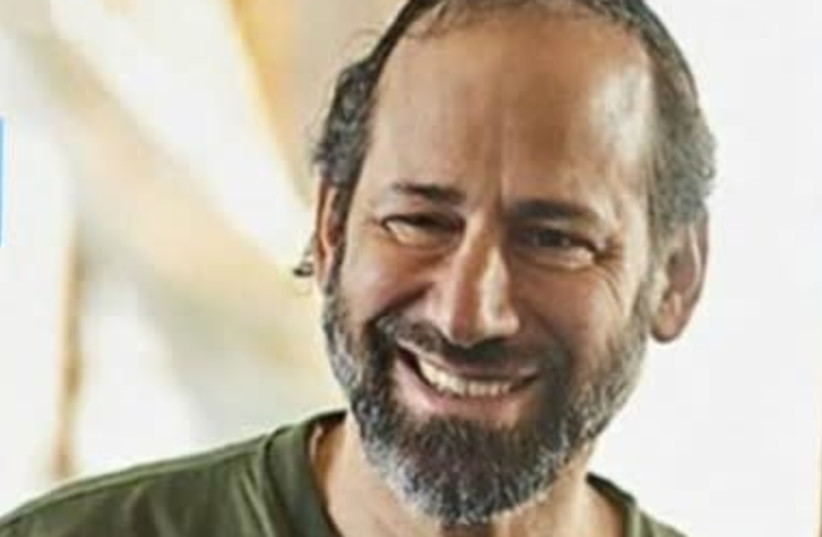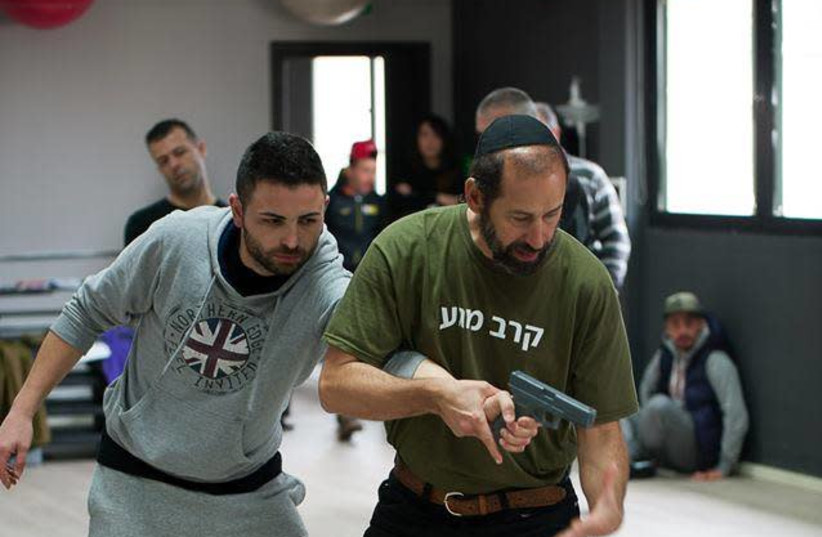When you hear about martial arts, you no doubt think about Karate, Judo or Jiu Jitsu. Any of these might help in defending oneself, although they require an inordinate amount of training.
But have you heard of Krav Maga? I must admit that I knew very little of this Israeli method of self-defense until I talked with the internationally acclaimed founder and head instructor of Israeli Krav International (IKI), 7th-Dan black belt Moshe Katz. I began by asking him what Krav Maga means. “The second word means contact,” he said. “And Krav loosely translated means combat. So it’s close-quarter combat.”

How does this method differ from the other martial arts?
To study martial arts, you need to understand the culture of its country of origin. If you look at Japanese, Chinese and Thai society, you’ll see what distinguishes those arts one from another. For example: Thai boxing, Japanese Kung Fu and Chinese Karate style of fighting is very much influenced by their culture. Similarly in Israel. We are an impatient people, a practical people. If you told an Israeli to spend ten years studying Tai Chi to achieve a type of self-defense, that won’t go over very well. Israelis want immediate practical results. So Krav Maga is very Israeli in its culture in that it’s designed to learn quickly, effectively, no nonsense and no spirituality.
Is it simpler to learn than all the other martial arts?
Absolutely, it’s designed to use only natural gross body movements that we all have, no finesse. The idea is for everybody to be able to learn it. It should not take many years of training.
When and by whom was it invented?
This is a very controversial topic. My school of thought differs from a lot of the commercial schools. They point to a God-like figure, Imi Lichtenfeld, who came from Slovakia, who is said to have founded this system; but history proved otherwise. There is no single founder and not only one contributor. When aliyah began in the 1880s and Jews began to come back to the Land of Israel in greater numbers, they were met with hostile violence by the Arabs and the first time a Jew lifted up his hands to defend himself, you can say that moment was the beginning of Krav Maga. As the years went on and Jews came from different countries, one brought a little bit of boxing, one a little bit of Jiu Jitsu. Each person added from their own experience; some from the military, some from sport and they helped to develop what eventually became Krav Maga.
Is Krav Maga only effective against a single attacker?
It’s effective against two or more as well but it takes more of a strategy. It’s not so much a matter of technique, but rather of situational awareness, position yourself in the right way and keep your eyes open. It’s not like a Film where one person spins around and kills several people at once. Two maybe three yes, but not more.
Is yours the umbrella organization for all Krav Maga teaching?
No, there are many competing organizations as there are in all martial arts. We are not the biggest, but I think we are one of the best and we operate now in 40 countries. What makes our organization different from the others is that I found the others to be to similar to other martial arts and too difficult to learn. I look at the ordinary person of any age and ability and ask, “Can they do the technique effectively in a moment of truth?”
Are the centers listed in Israel connected with one another?
No. Each organization is separate with their own program and instructors. The differences between them is like that between one Hassidic group and another. Each one has their own slightly different philosophy and approach.

If I want to take a course, how do I know which place to choose?
That’s a very important question. I suggest to try them out as you are the best judge of your own body. If you go to a Krav Maga class and after two, three or four lessons you still cannot do the technique, then maybe something is wrong with the instructor, or with the technique, that has to work for the person. With us a person walks away after one lesson and already feels that they can do certain things to defend themselves.
You travel all over the world from Argentina to Australia to teach Krav Maga to Martial Arts instructors; but how did you begin?
I was studying in yeshiva and didn’t really want to learn defense, until I was told to see the film The Karate Kid. I still considered it a waste of time and rather wanted to study Torah. However, I agreed to go with a friend to one karate class and liked it. After some time I found that karate was not quite as effective as I hoped for street self-defense, so I evolved into Krav Maga.
Krav Maga practitioners are graded according to colors. You are a black belt and a seventh dan. Can you explain those distinctions and who awarded you that grade?
I trained with one of the top instructors in Israel, Itai Gil, who for many years trained Israeli special forces, the secret police and more. I trained with him practically daily for 18 years. By that point I had achieved with him the rank of fourth degree black belt. I was the only person in the world who received that grade from him. The rest of the ranks came from international organizations that awarded me these ranks, based on the recommendations of my students and things that they have seen me accomplish around the world.
Your teacher trained special forces. I know that you have done some of that too. Tell me about it.
Yes, I was greatly honored when the US Army flew me in on a couple of occasions to train their green berets and some of their special forces at locations that I am not allowed to mention. I have also been called to train American infantry units and I trained security guards all over the world. All that was a great honor and privilege.
To reach the level that you have achieved surely takes a great deal of practice. Should one start early in life, and if so at what age is it safe?
I taught children for nearly 20 years and found that each ages has its own level of appropriateness. You don’t want to scare a child aged five or six with a gun or a knife. So when we deal with the younger ages, it will be five percent physical, but 95 percent awareness, not to follow a stranger and so on. As they got older, it became more physical and less psychological. I personally found that the age of seven was effective, but still making it more of a game and stick to simple movements that they could learn. Teaching a child complex movements would be counter-productive.
Do you advocate that self-defense be a part of the school curriculum?
Absolutely, Children are unfortunately subject to violence in our society, especially during this period of corona when we see a spike in domestic violence. All have a right to defend ourselves and criminals don’t distinguish between weight categories or young or old age. That’s why we teach a very simple system that can be used regardless of our physical condition or age. Everyone needs to learn how to defend himself and that’s the key point of my philosophy.
Can women use Krav Maga effectively against a strong male attacker?
I would say absolutely, and we had many cases where women have defended themselves. But wee are not looking for a victory for an Olympic match with a woman celebrating a victory. I teach block, escape, get away not necessarily beat the man up. Defend and get away. My slogan is APC, ability, purpose, circumstance. You decide how to counter a situation for instance if a woman is alone in a parking lot she has no particular purpose to be there and the circumstance is – she is alone. Without great ability, block defend yourself and run away. On the other hand if you are a security guard, strong and trained and confronted with a knife wielding attacker, your ability is high, your purpose is to protect the people inside; the circumstance is that if he is ineffective a tragedy inside may develop, so he may not block and run, we teach that his job is to fight to the finish, that’s why he is there.
You are tall and look strong. Does the ability to effectively use this method of self-defense depend on physique?
I have a slogan called “the three unreliable friends” – Physical strength, your speed and your precision. Most martial art is based exactly on that and I say these are unreliable. If we rely on those, we will not be successful, because there is always going to be somebody stronger; there is always going to be somebody faster and at moments of stress it will be very difficult to use precision to grab a person when they are moving around. So we don’t rely upon these things. It’s great to have them, but we rely on sound techniques and the natural body movement. It’s interesting what you say about me. Compared to most Krav Maga instructors I don’t look very tough and people often say I look more like a rabbi than a Krav Maga instructor, but I say the wisdom of the Jewish people is our strength. If you had to look like Charles Atlas or the Hulk or a body-builder, than only very few of us would be successful.
I am biologically an old man and no longer very strong. Could I still learn Krav Maga to be of some practical use to me?
“I certainly believe so,” said Moshe Katz, and taught me how to force a pistol out of a man’s hand.
Moshe Katz’s email is Moshe Katz
